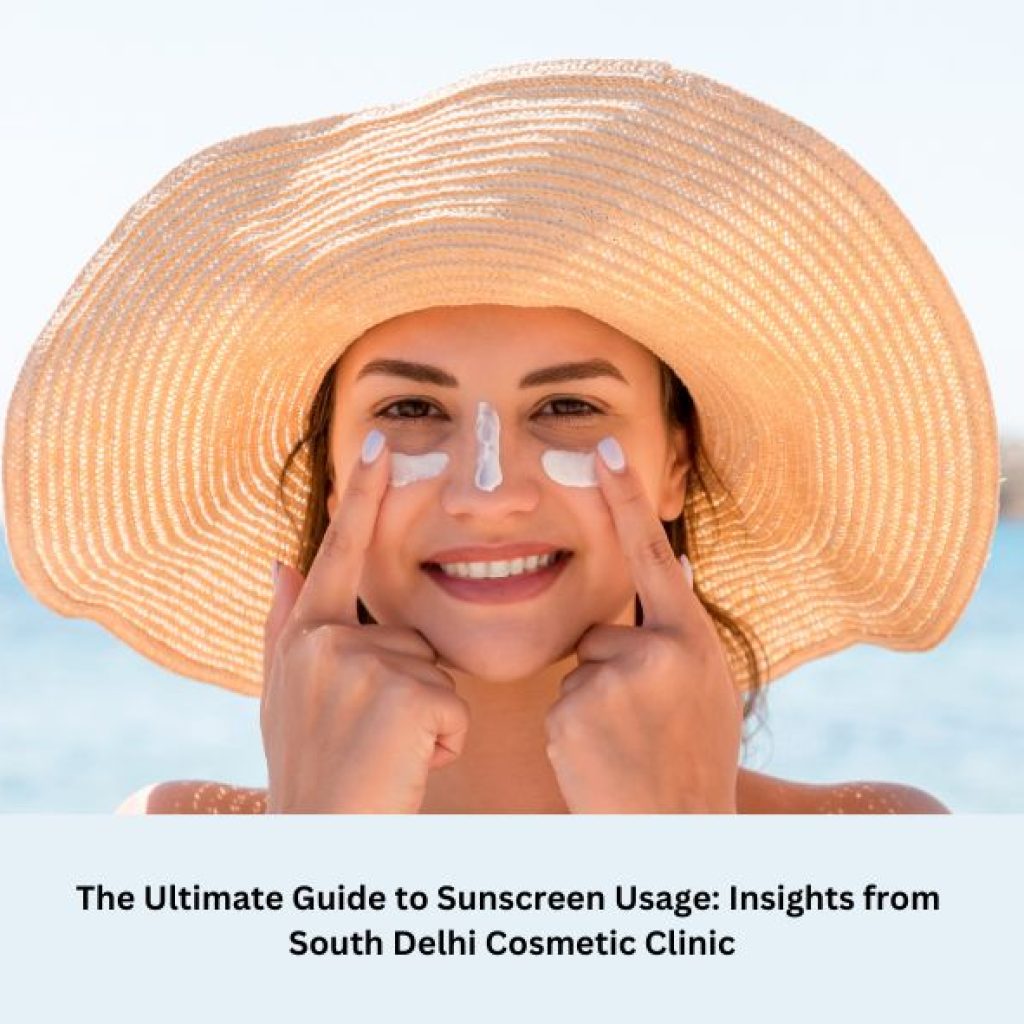
Sunscreen is an essential part of any skincare routine, yet its importance is often overlooked. In South Delhi, where the sun shines brightly for most of the year, using sunscreen is not just a recommendation but a necessity. At South Delhi Cosmetic Clinic, we emphasize the significance of sunscreen in maintaining healthy, youthful skin. This comprehensive guide will delve into the benefits of sunscreen, how to choose the right product, and tips for effective application.
The Importance of Sunscreen
Protection Against Harmful UV Rays
The sun emits two types of ultraviolet (UV) radiation that can harm your skin: UVA and UVB. UVA rays penetrate deep into the skin, leading to premature aging and wrinkles, while UVB rays cause sunburn and can contribute to the development of skin cancer. Sunscreen acts as a barrier, protecting your skin from these harmful rays and reducing the risk of long-term damage.
Prevention of Skin Cancer
Skin cancer is one of the most common cancers globally, and its incidence is rising. Regular use of sunscreen significantly lowers the risk of developing skin cancer by protecting the skin from harmful UV radiation. According to the American Academy of Dermatology, daily use of SPF 15 or higher sunscreen can reduce your risk of developing squamous cell carcinoma by about 40% and melanoma by 50%.
Slowing Down Skin Aging
Prolonged sun exposure accelerates the aging process of the skin, leading to the formation of wrinkles, fine lines, and age spots. Sunscreen helps maintain a youthful appearance by preventing these signs of aging. Studies have shown that individuals who use sunscreen daily have significantly fewer signs of aging compared to those who do not.
Choosing the Right Sunscreen
Broad-Spectrum Protection
When selecting a sunscreen, it’s crucial to choose a broad-spectrum product that protects against both UVA and UVB rays. This ensures comprehensive protection from the full spectrum of harmful UV radiation.
SPF Factor
The Sun Protection Factor (SPF) indicates the level of protection a sunscreen offers against UVB rays. For everyday use, an SPF of 30 is recommended, as it blocks approximately 97% of UVB rays. For extended outdoor activities, a higher SPF may be necessary.
Skin Type Considerations
Different skin types have different needs when it comes to sunscreen:
- Oily Skin: Opt for oil-free, non-comedogenic formulas that won’t clog pores.
- Dry Skin: Look for sunscreens with hydrating ingredients like hyaluronic acid or glycerin.
- Sensitive Skin: Choose sunscreens with physical blockers like zinc oxide or titanium dioxide, which are less likely to cause irritation.
Water Resistance
If you plan to swim or sweat, choose a water-resistant sunscreen. However, it’s essential to reapply it every two hours or immediately after swimming or sweating to maintain protection.
Tips for Effective Sunscreen Application
Apply Generously and Evenly
Most people do not apply enough sunscreen, which significantly reduces its effectiveness. Use about one ounce (a shot glass full) to cover your entire body, and don’t forget often-missed areas like the ears, back of the neck, and tops of the feet.
Reapply Regularly
Sunscreen should be reapplied every two hours, or more frequently if you are swimming or sweating. Even if a sunscreen is labeled as “water-resistant,” it doesn’t mean it provides all-day protection.
Use Year-Round
Sunscreen is not just for summer. UV rays can penetrate clouds and windows, meaning your skin is exposed even on cloudy days and during winter. Make sunscreen application a year-round habit.
Don’t Rely Solely on Sunscreen
While sunscreen is crucial, it shouldn’t be your only line of defense. Wear protective clothing, seek shade, and avoid peak sun hours (10 a.m. to 4 p.m.) to further reduce your UV exposure.
Myths and Facts About Sunscreen
Myth: People with Dark Skin Don’t Need Sunscreen
Fact: While it’s true that people with darker skin have more melanin, which offers some protection against UV rays, they can still suffer from sun damage and skin cancer. Everyone, regardless of skin tone, should use sunscreen.
Myth: Sunscreen Causes Vitamin D Deficiency
Fact: Sunscreen use does not block all UV rays and does not prevent the production of vitamin D. Spending short periods in the sun without sunscreen and consuming vitamin D-rich foods can help maintain adequate levels.
Myth: Waterproof Sunscreen Doesn’t Need Reapplication
Fact: No sunscreen is entirely waterproof or sweatproof. Always reapply every two hours, especially after swimming or sweating.
Sunscreen and Cosmetic Treatments
Pre-Treatment Protection
If you are considering cosmetic treatments such as chemical peels, laser treatments, or microdermabrasion at South Delhi Cosmetic Clinic, it’s crucial to protect your skin from the sun before undergoing these procedures. Sunburned or tanned skin can increase the risk of complications and prolong recovery time.
Post-Treatment Care
After cosmetic treatments, your skin may be more sensitive to the sun. Applying sunscreen diligently will protect your skin and enhance the results of the treatment. Your dermatologist at South Delhi Cosmetic Clinic can recommend suitable sunscreens that cater to your specific post-treatment needs.
Conclusion
In the bustling heart of South Delhi, where sun exposure is inevitable, sunscreen is your skin’s best friend. It not only protects against immediate damage like sunburn but also shields you from long-term effects such as premature aging and skin cancer. By choosing the right sunscreen and applying it correctly, you can enjoy the sun safely and maintain healthy, radiant skin.
At South Delhi Cosmetic Clinic, we are committed to helping you achieve and maintain beautiful skin. Our expert team can provide personalized recommendations and skincare routines that include the best sunscreens for your skin type and lifestyle. Visit us to learn more about how to protect your skin from the sun and keep it looking its best year-round.


